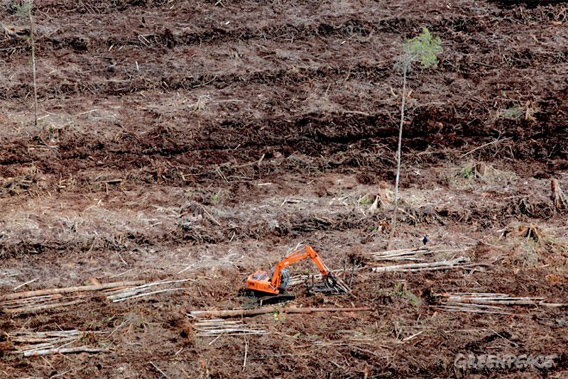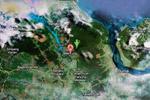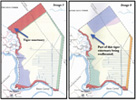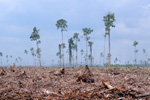
Active clearance of peat swamp forest by APP pulpwood supplier PT Mutiara Sabuk Khatulistiwa. Photo © Greenpeace.
Indonesia’s Ministry of Forestry signed off on a plan by Asia Pulp & Paper (APP) suppliers to log areas of forest that contained protected ramin species, according to documents released by Greenomics-Indonesia, an activist group. The micro-delineation documents, which are required to win approval for forestry projects in Indonesia, confirm that APP suppliers were aware that ramin trees were present in the concessions, which have since been converted to wood-pulp plantations.
The revelations come shortly after Greenpeace released the results of an investigation that found contraband ramin logs at APP’s Indah Kiat Perawang pulp mill. The findings potentially put APP in violation of Indonesian law and CITES, an international agreement on trafficking of endangered species. They could also theoretically result in sanctions against some APP products in the United States under the Lacey Act.
For its part, APP said it would investigate Greenpeace’s findings. Last week it sent a “specialist team” to the mill, although it is unclear whether any independent auditors were present during the exercise.
 Is Indonesia’s Ministry of Forestry ignoring the country’s commitment under the Convention on International Trade in Endangered Species of Wild Fauna and Flora (CITES)? |
The paper products giant maintains it has a “a strict zero tolerance policy for illegal wood entering the supply chain and has comprehensive chain of custody (CoC) systems to ensure that only legal wood enters its pulp mill operations.” APP says it surveys forest areas for ramin trees prior to clearing. Any protected species are left standing, though observers say these usually fair poorly without other trees to protect them from wind damage.
APP also says its system includes checks to “automatically reject or destroy unqualified wood, including protected species, in line with the respected law and regulations.”
“Unqualified wood, including Ramin and other protected species, is clearly identified, separated, filed and reported,” it says. “A warning and penalty are given to the wood supplier.”
Still APP has yet to explain why Greenpeace was able to document ramin logs among other logs in its facility in Sumatra. Furthermore, independent testing has found mixed tropical hardwood (MTH) — which in Asia only come from rainforests — in some of APP’s virgin fiber products, indicating that rainforest trees — whether or not they are ramin — are indeed being used as a source of fiber.
The new Greenomics report raises broader questions about the Ministry of Forestry’s approval process for concessions in areas with protected species. APP suppliers appear to have clearly disclosed the presence of ramin in their micro-delineation documents, yet they didn’t request — nor did the Forestry Ministry demand — the required permit for logging ramin habitat.
In the end, it is unclear whether ramin trees — even if spared from initial clearing — survived the conversion of their habitat to pulpwood plantations. It may be that ramin are incapable of thriving after their ecosystem is lost.
Editor’s note: APP and the Ministry of Forestry did not immediately return requests for additional comment.
Related articles
After illegal logging allegations, certifier lodges complaint against paper giant APP
(03/07/2012) Less than a week after Greenpeace released evidence that protected tree species were being illegally logged and pulped at an Asia Pulp and Paper (APP) mill in Sumatra, a major certifier, the Program for the Endorsement of Forest Certification (PEFC), has lodged a complaint and asked for an investigation. In addition to PEFC’s move, the National Geographic Society (NGS), which was found to be sourcing from APP recently, has publicly broken ties with the company, and Greenpeace has handed over its evidence to Indonesian police who told the group there would be an investigation.
Investigation links APP to illegal logging of protected trees

(03/01/2012) A year-long undercover investigation has found evidence of Asia Pulp and Paper (APP) companies cutting and pulping legally protected ramin trees, a practice that violates both Indonesian and international law. Found largely in Sumatra’s peatswamp forests, the logging of ramin trees (in the genus Gonystylus) has been banned in Indonesia since 2001; the trees are also listed under Appendix II of the Convention on International Trade in Endangered Species (CITES) and thus require special permits to export. The new allegations come after APP, an umbrella paper brand, has lost several customers due to its continued reliance on pulp from rainforest and peatland forests in Sumatra.
National Geographic linked to rainforest destruction

(03/01/2012) A new report by Greenpeace has found a direct link between National Geographic Society (NGS) products and rainforest destruction in Indonesia that threatens tigers and orangutans. An analysis on National Geographic books found Sumatran rainforest fiber from Asia Pulp and Paper (APP), a brand whose suppliers have been linked to rainforest destruction in Sumatra, and, in the most recent Greenpeace report, alleged illegal logging of protected rainforest trees. One of the world’s largest non-profit science and educational organizations, National Geographic is known worldwide for its magazines, documentaries, and award-winning photos. The organization also has a long-standing history of championing environmental and conservation issues. However, National Geographic says it has not sourced APP paper for “several years.”
Paper giant hammered on forest certification claims

(02/15/2012) Beleaguered paper giant Asia Pulp & Paper was sharply criticized Wednesday for its claims that its operations are certified sustainable by independent auditors. WWF said its survey of certifiers and certification schemes shows that none apply to ‘the most controversial operations’ of APP’s suppliers: clearing of rainforests and peatlands that are home to endangered tigers, elephants, and orangutans. In responding to complaints from environmentalists that its operations are responsible for large-scale destruction of native forests, APP often touts various certification standards which it says demonstrate its commitment to sustainability. Yet the new WWF survey found that these standards don’t apply across all of the paper giant’s operations — APP’s suppliers in Indonesia continue to harvest and convert natural forests. Nor do the certification standards necessarily prove that APP’s forest management practices are ‘sustainable’.
Some toilet paper production destroys Indonesian rainforests, endangering tigers and elephants

(02/09/2012) American consumers are unwittingly contributing to the destruction of endangered rainforests in Sumatra by purchasing certain brands of toilet paper, asserts a new report published by the environmental group WWF. The report, Don’t Flush Tiger Forests: Toilet Paper, U.S. Supermarkets, and the Destruction of Indonesia’s Last Tiger Habitats, takes aim at two tissue brands that source fiber from Asia Pulp & Paper (APP), a paper products giant long criticized by environmentalists and scientists for its forestry practices on the Indonesian island of Sumatra. The brands — Paseo and Livi — are among the fastest growing, in terms of sales, in the United States.
New analysis supports claim that paper giant cleared part of its tiger sanctuary in Indonesia

(12/21/2011) Asia Pulp & Paper (APP)’s supplier PT Ruas Utama Jaya has indeed cleared an area of forest it pledged to set aside as a tiger conservation reserve in Sumatra reports a legal analysis by Greenomics, an Indonesian environmental group. The Greenomics’ analysis supports allegations originally set forth in a report published last week by Eyes of the Forest, a coalition of green groups, and seems to refute a press release issued by APP that called the deforestation allegations ‘fiction’.
WWF: Asia Pulp & Paper misleads public about its role in destroying Indonesia’s rainforests

(12/16/2011) Asia Pulp & Paper (APP) continues to mislead the public about its role in destroying rainforests and critical tiger habitat across the Indonesian island of Sumatra, alleges a new report from Eyes on the Forest, a coalition of Indonesian environmental groups including WWF-Indonesia. The report, titled The truth behind APP’s Greenwash, is based on analysis of satellite imagery as well as public and private documentation of forest cleared by logging companies that supply APP, which is owned by the Indonesian conglomerate, Sinar Mas Group (SMG). The report concludes APP’s fiber suppliers have destroyed 2 million hectares of forest in Sumatra since 1984.
Paper commitments for the Indonesian industry

(12/13/2011) The Indonesian group Asia Pulp & Paper (APP) has been the target of many NGOs for years due to its alleged negative impacts on tropical forests. This culminated in a spectacular campaign launched by Greenpeace in 2011 based on Ken “dumping” Barbie. The rationale was that toy brand Mattel was accused of using APP paper products linked to the clear-cutting of natural forests in the Indonesian archipelago. APP organized a counter-attack in the media with the daily publication of advertisements promoting its sustainable development practices. Journalists from all over the world were also invited to attend guided tours of APP concessions to demonstrate their conservation efforts, and a number of articles were subsequently written.